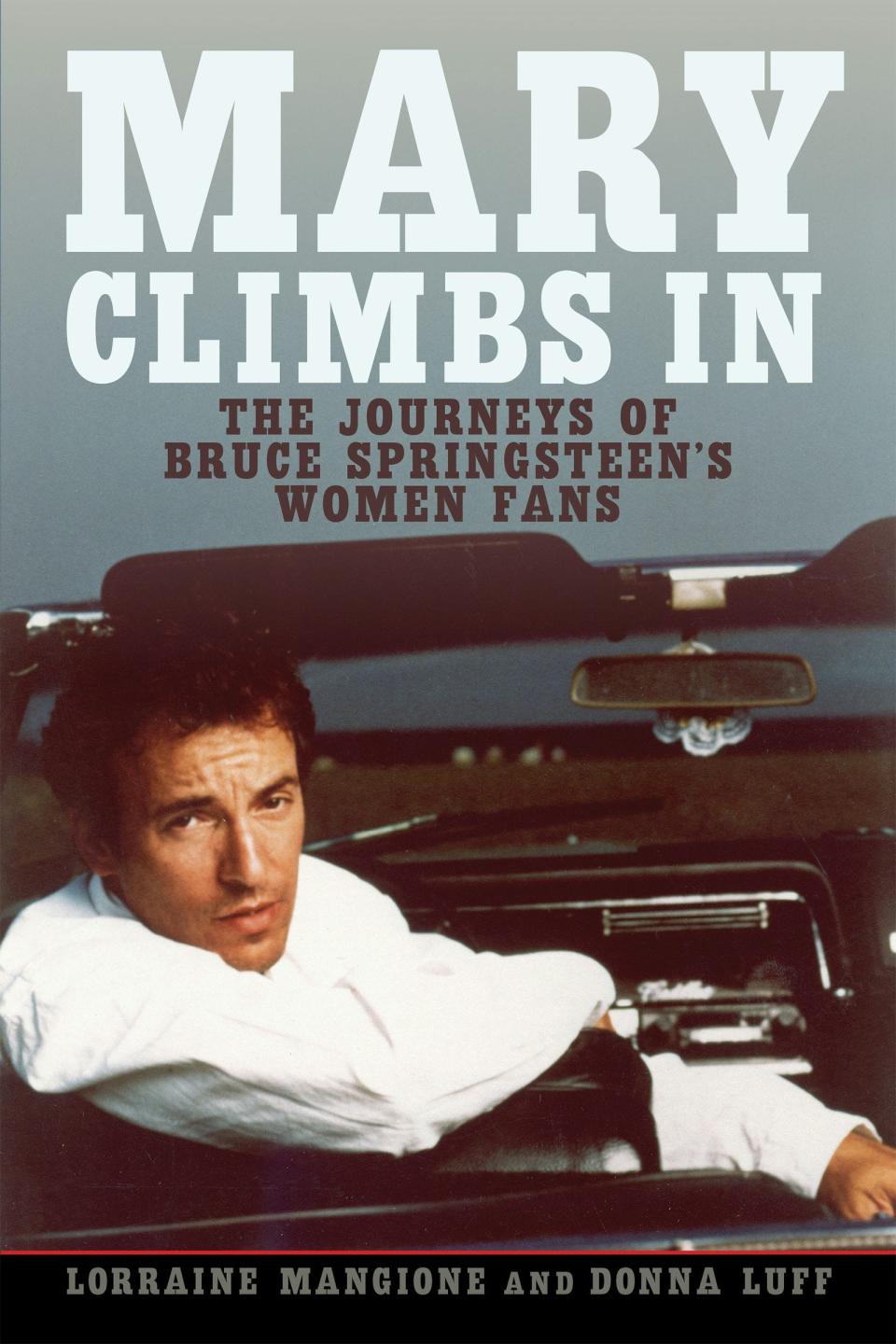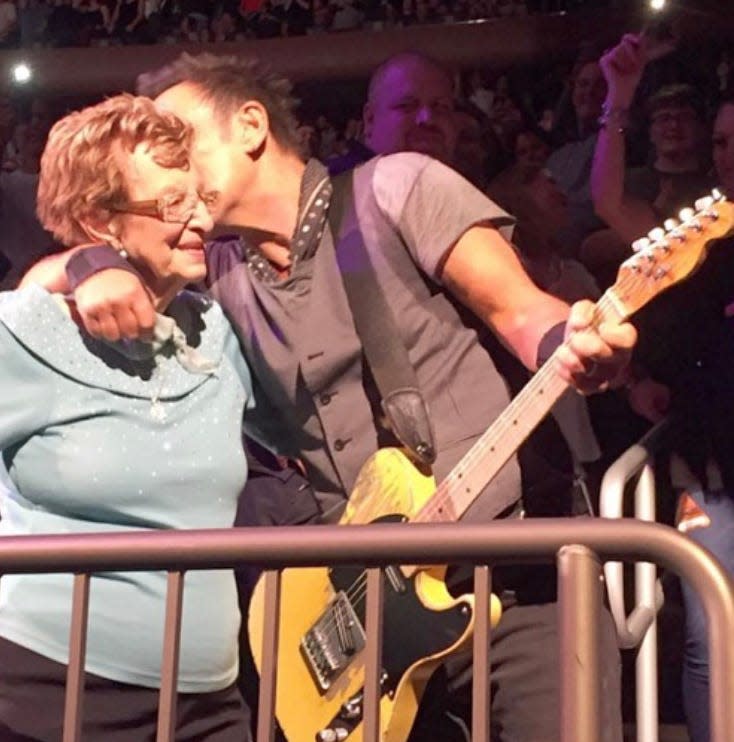Here are iconic female characters in Bruce Springsteen songs, from Mary to Wendy
Bruce Springsteen is "Born to Run," but what about Wendy?
Lorraine Mangione and Donna Luff have something to say about that in their new and enlightening "Mary Climbs In: The Journeys of Bruce Springsteen's Women Fans." The book looks at the experiences of female Boss fans as revealed by surveys. More than a thousand fans participated.
"For women fans, their introduction to Springsteen and his music happened across generations, within families, something perhaps uncommon in rock music fandom, certainly in the early decades of his career," writes Mangione and Luff in the book. "Learning about Springsteen sometimes coincided with a significant event or time in their lives, such as a crisis or searching for something of meaning."
The role of women in Springsteen's songs is complex. Sure, there's the "hey little girl" stance, as noted by the authors, but beyond that women in his songs are "independent, smart, hardworking —- admired and desired by men yet respected (and those who are disrespected do something about it)," states a fan in a survey.
The women in Springsteen's music, unlike the depiction of women in rock ‘n’ roll for decades, are multi-faceted and complex. Their role is pivotal in Springsteen's, and his fans’, worlds.
We asked Mangione, a professor of clinical psychology at Antioch University New England, and Luff, an educator at Boston Children’s Hospital and faculty member at Harvard Medical School, to name their five most iconic women from Springsteen's music.
Their answers are below. Visit rutgersuniversitypress.org for more info on "Mary Climbs In."
Mary (multiple songs)
Mary is everywhere. She’s the "Queen of Arkansas"; "Jesus Was an Only Son" to Mary; Mary was at "The River" … and many more images.
In her varied incarnations, Mary is a powerful, deep, sustaining, loving, bold, sometimes scared, often complicated character. Two stand out: Mary who “climbs in” (or not) in "Thunder Road," and Mary who threw a party on "The Rising" in the song " Mary's Place."
In “Thunder Road,” Mary is no beauty — a line that many women in our survey noted with love or despair, some feeling understood, others insulted — but a woman with plenty to offer beyond looks. It is easy to imagine her hidden internal life, layers of feelings and thoughts, that captivated the guy, who’s not a hero. There’s a real sense of two equals riding off together: There’s no savior and saved, but there is a promised land and, together, they might find it. But she has to climb in, it is all up to her.
The second Mary, who threw a party at her place on "The Rising," reminded us of life, love and gratitude after the horror of 9/11. Her graciousness and generosity, in offering the party and hope that many needed, helped us in rising again. This Mary is transcendent: at her “place” there’s Buddha and angels and candles, and the holy name of Mary, healing our souls. She sees the darkness but doesn’t linger there. She brings us out of that hole: the rain doesn’t stop, but the crowd starts shouting.
Two Marys, strong, loving, self-defined, transformative characters, whether with one person or the world.
Janey/Jane (multiple songs)
Another woman character who appears often in Springsteen’s writing is Janey, or Jane. In his early songs, Janey is the “crazy” lover making out in the dirt, or “Puerto Rican Jane” enticing Johnny away from the “romantic young boys” into her bed.
She’s a wild woman, a seductress, a young man’s fantasy as much as a woman. Over the years, as Springsteen’s writing matures, life gets harder, or more realistic, for Janey, and Springsteen’s empathy for her grows. In “Janey Don’t You Lose Heart,” the singer pleads with her to hold on through despair, promising companionship in the darkest times.
It is in “Spare Parts,” released a couple of years later, that Janey’s independence comes of age. Left pregnant by Bobby (perhaps, despite his earlier promises in “Janey Don’t You Lose Heart”), Janey’s despair turns into resilience. At the river, thinking about letting her child go, she finds an inner strength and carries him home. As listeners, we sense that Janey will move on into a life that she will direct, starting out with “good cold cash” in exchange for her engagement ring, reliant now on herself not on men.
More: Bruce Springsteen gives a 'Christmas Gift' to Darlene Love on stage in New York

Wendy ('Born to Run')
It’s hard to write anything about Springsteen’s songs without mentioning “Born to Run.” That alone makes Wendy one of his most iconic female characters. The protagonist’s plea to Wendy to “let me in, let me be your friend” is one of the most yearning, romantic and yet companionate moments in rock 'n' roll. He’s not promising to save Wendy, he’s begging to be her friend.
He wants to “guard her dreams and visions,” but he’s also aware of the “madness in his soul” that’s driving his love. His desire to save or guard her comes hand-in-hand with a clarity that he too needs saving and guarding. This is a journey for two.
Interestingly, Wendy never reappears by name again in Springsteen’s work. But the echo of her seems to permeate many of the unnamed female characters in Springsteen’s later songs. We hear her legacy in the mature, complicated relationships between men and women depicted in his love songs from "The River" onwards, as Springsteen explores all that complexity that life brings, what can happen to youthful lovers after the running away.
More: 30 years ago, Bruce Springsteen became a LGBTQ ally with 'Streets of Philadelphia'
Unnamed ('Point Blank')
Who is this nameless woman, shot between the eyes, shot “Point Blank,” who falls from grace as the singer’s beloved to become a woman on the streets, tottering on the edge of death? If she makes one wrong move, if she rebels against what the patriarchal, cruel world demands that she do … the lights go out, her life over.
Some of the most iconic women in Springsteen’s songs, characters who resonated with women in our study, are unnamed. In “Point Blank,” her story is a familiar one of a girl with limited power to define herself or give voice to who she is, who had to grow up and grow tough before her time, disparaged and destroyed by the battering of an unforgiving society. She was “going to be his Juliet,” and just like Shakespeare’s Juliet, love has unraveled, and tragedy has claimed her.
He calls her name, but she doesn’t answer. Now the damage is in her heart, the bullets of society, of lies, destroyed her, shot her point blank. Is she one woman or many women? Countless women have lived this life, resisted, fought, lost the fight. This unnamed woman embodies the struggles and sorrows of all women battered again by the world that has always beaten them down.
Adele Springsteen (Bruce's mom)

Troubled father-son relationships are a recurring theme in Springsteen’s work. He is not alone — paternal conflicts are rife in rock 'n' roll. What is more unusual is that he once wrote about his mother, and presented a loving, powerful relationship.
He doesn’t seem to want to brag about it. “The Wish” was never released on any of his major albums (it appears in the outtakes’ compilation "Tracks"), and he rarely plays the song live, “Springsteen on Broadway" not withstanding. But in our study of Springsteen’s women fans, several wrote about how much they love this song. Others cited the way that Springsteen treats his mother — “You have to love a man who brings his mom on to stage to dance with her” — as evidence of his support for women, and against charges of sexism sometimes leveled at his work.
“The Wish” is a homage to his mother’s indomitable spirit, and credits her for putting the rock 'n' roll in him: pulling him up from the couch to dance, buying him that first guitar. The image of mother and son finding “a little rock 'n' roll bar” to dance together tugs at many a mother’s heartstrings.
It’s a relatively unknown song in a large catalogue of work — but its impact, like that of the woman it depicts, is outsized.
Subscribe to app.com for the latest on the New Jersey music scene.
Chris Jordan, a Jersey Shore native, covers entertainment and features for the USA Today Network New Jersey. Contact him at @chrisfhjordan; [email protected].
This article originally appeared on Asbury Park Press: Bruce Springsteen iconic women in songs include Wendy, Mary
